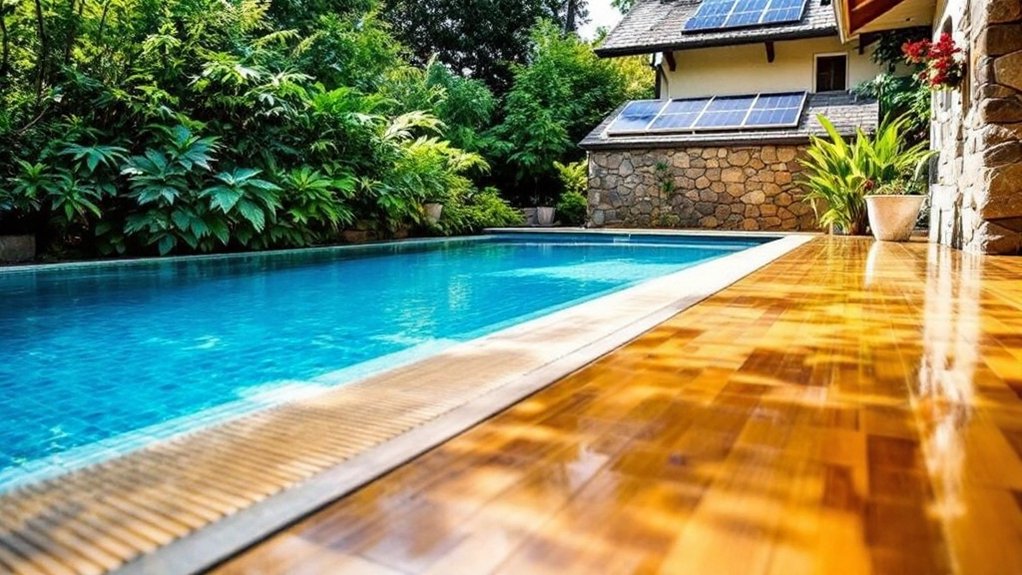Water-saving pool features are becoming increasingly essential in today’s eco-conscious environment. By integrating advanced technologies and sustainable practices, pool owners can greatly reduce water waste. From smart filtration systems to automatic pool covers, various options enhance efficiency while promoting conservation. Exploring these features reveals a path to a more sustainable pool experience. What innovative solutions can transform a standard pool into a resource-saving oasis?
Smart Filtration Systems: Enhancing Efficiency
As water conservation becomes increasingly essential, smart filtration systems have emerged as an important solution for enhancing pool efficiency. These advanced systems utilize cutting-edge technology to optimize water circulation and filtration processes, greatly reducing overall water consumption. By employing variable-speed pumps, smart filtration systems can adjust their operation based on real-time pool conditions, ensuring efficient energy use while maintaining water clarity. Additionally, many systems feature automated monitoring capabilities, allowing for timely adjustments and minimizing water waste due to over-filtering. With integrated sensors, they can detect debris levels and activate only as needed, further conserving water. Overall, smart filtration systems not only contribute to effective pool maintenance but also play a crucial role in promoting sustainable water usage in residential and commercial swimming pools. Regular checks for pool safety measures ensure that these systems operate optimally without compromising safety.
Automatic Pool Covers: Reducing Evaporation
Automatic pool covers offer significant benefits in reducing water evaporation, thereby conserving precious resources. In addition to their water-saving capabilities, these covers can enhance energy efficiency by maintaining water temperature and reducing heating costs. Proper maintenance and care are essential to guarantee their longevity and peak performance. Regular inspections can help identify potential issues that may arise, ensuring that the automatic pool cover functions effectively over time.
Benefits of Automatic Covers
While many pool owners seek ways to enhance their outdoor experience, the benefits of automatic covers extend beyond convenience, markedly reducing water evaporation. These covers effectively seal the pool, minimizing the surface area exposed to air, thereby limiting moisture loss. This feature not only conserves water but also lessens the need for frequent refills, saving both time and resources. Additionally, automatic covers help maintain pool temperature, which can further reduce the impact of evaporation. By employing this technology, pool owners can enjoy a cleaner, more inviting swimming environment while contributing to sustainable water use. Ultimately, automatic covers represent a practical investment in both pool maintenance and environmental stewardship.
Energy Efficiency Considerations
The installation of automatic pool covers not only serves to reduce water evaporation but also greatly enhances energy efficiency. By minimizing heat loss during cooler nights and preventing debris accumulation, these covers considerably lower the energy required for heating and maintaining ideal water temperatures. With reduced reliance on pool heaters, homeowners can expect decreased energy bills and a lower environmental impact. Additionally, automatic covers can extend the swimming season, allowing for enjoyable use even in cooler months. Consequently, investing in an automatic pool cover not only conserves water but also aligns with sustainable practices, making it an invaluable feature for energy-conscious pool owners. This dual benefit underscores the importance of energy efficiency in modern pool management.
Maintenance and Care Tips
How can pool owners guarantee the longevity and effectiveness of their automatic pool covers in reducing evaporation? Regular maintenance is vital. Owners should routinely check the cover for tears, dirt, or debris, as these can hinder its performance. Cleaning the cover with a soft brush and mild soap helps prevent buildup that may cause damage. Additionally, inspecting the tracks and mechanisms for obstructions guarantees smooth operation. It is essential to operate the cover according to the manufacturer’s guidelines, preventing unnecessary wear. Owners should also monitor water chemistry, as imbalanced levels can affect the cover’s material. Finally, storing the cover properly during off-seasons protects it from harsh weather, guaranteeing it remains a reliable water-saving feature for years to come.
Rainwater Harvesting: Utilizing Nature’s Resource
What if homeowners could transform their swimming pools into eco-friendly oases? Rainwater harvesting presents a sustainable solution for pool maintenance, allowing homeowners to utilize nature’s resources effectively. By installing a rainwater collection system, homeowners can channel rainwater into storage tanks, which can later be used to refill or maintain pool water levels. This practice not only conserves potable water but also reduces the demand on local water supplies. Additionally, rainwater is typically free from chemicals, making it a more natural alternative for pool replenishment. Implementing this eco-friendly feature not only aids in water conservation efforts but also enhances the overall sustainability of the swimming pool, promoting a greener lifestyle while enjoying the benefits of a revitalizing swim.
Energy-Efficient Pool Pumps: Lowering Water Use
Energy-efficient pool pumps greatly reduce water usage while maintaining ideal pool performance. These pumps operate at lower horsepower compared to traditional models, which minimizes the amount of water circulated and treated. By using advanced technology, they can adjust their speed according to the requirements of the pool, ensuring maximum efficiency. This not only conserves water but also lowers energy consumption, resulting in reduced utility bills. In addition, energy-efficient pumps help prevent over-circulation, which can lead to unnecessary water loss through evaporation and splashing. As a result, pool owners can enjoy a well-maintained pool while contributing to water conservation efforts. Investing in these pumps is a smart choice for environmentally conscious individuals seeking sustainable pool management solutions.
Eco-Friendly Pool Chemicals: Protecting Water Quality
Maintaining a clean and safe swimming environment is just as important as reducing water usage in pool management. Eco-friendly pool chemicals offer a sustainable solution to water quality issues without contributing to environmental harm. These alternatives, such as natural enzymes and mineral-based sanitizers, effectively eliminate contaminants while minimizing chemical runoff and toxicity. By using biodegradable and non-toxic products, pool owners can protect local ecosystems and improve water clarity. Additionally, eco-friendly options often require less frequent application, reducing overall chemical consumption. This not only benefits the environment but also enhances the longevity of pool equipment. Ultimately, embracing eco-friendly pool chemicals is a crucial step toward achieving both water conservation and a safe, enjoyable swimming experience.
Landscaping for Water Conservation: Designing Around Your Pool
Landscaping around a pool can greatly contribute to water conservation efforts. By selecting native plants that require less water and implementing efficient irrigation systems, homeowners can create an attractive environment while minimizing water usage. These strategies not only enhance the pool’s aesthetic appeal but also promote sustainable practices.
Native Plant Selection
How can the careful selection of native plants enhance the beauty of poolside landscaping while promoting water conservation? By incorporating native flora, homeowners can create visually appealing environments that thrive in local climates. Native plants require less water, making them ideal for poolside landscaping, as they are adapted to regional rainfall patterns and soil types. Their resilience reduces the need for irrigation, thereby conserving water resources. Additionally, these plants support local wildlife and contribute to biodiversity, enriching the ecosystem around the pool. With a variety of textures, colors, and seasonal blooms, native plants can enhance the aesthetic appeal of the pool area while minimizing environmental impact. This thoughtful approach fosters a sustainable and beautiful outdoor space.
Efficient Irrigation Systems
The integration of efficient irrigation systems complements the use of native plants in poolside landscaping, further enhancing water conservation efforts. These systems, such as drip irrigation and smart timers, deliver water directly to plant roots, minimizing evaporation and runoff. By programming irrigation schedules based on weather conditions, homeowners can guarantee their plants receive adequate moisture without waste. Additionally, rainwater harvesting systems can be implemented to collect and utilize precipitation for irrigation purposes, further reducing reliance on municipal water supplies. Employing soil moisture sensors can also optimize water use by providing real-time data on when plants need watering. Overall, efficient irrigation systems not only support sustainable landscaping but also contribute considerably to conserving water resources around the pool area.
Leak Detection Systems: Preventing Water Loss
A considerable percentage of pool water loss can be attributed to undetected leaks, making leak detection systems essential for efficient pool maintenance. These systems utilize advanced technology to identify and monitor leaks that may go unnoticed by pool owners. By employing sensors and pressure testing, they can pinpoint exact locations of water loss, allowing for prompt repairs. This proactive approach not only conserves water but also minimizes chemical imbalances caused by fluctuating water levels. Further, regular monitoring can lead to reduced utility costs and a longer lifespan for pool infrastructure. Consequently, investing in leak detection systems can markedly enhance the overall sustainability of pool ownership, ensuring that water resources are used judiciously while maintaining ideal pool conditions.
Solar Heating Solutions: Minimizing Water Replacement
While many pool owners seek ways to enhance their enjoyment and maintain their pools, solar heating solutions offer an effective means of minimizing water replacement. By harnessing the sun’s energy, these systems not only warm the pool water but also reduce evaporation rates. When water is heated using solar panels, it can maintain a more consistent temperature, decreasing the need for additional water due to evaporation losses. In addition, solar heating systems are environmentally friendly and cost-effective over time, as they utilize renewable energy. This approach not only conserves water but also limits the chemical treatments needed, creating a healthier pool environment. Ultimately, solar heating solutions represent a sustainable investment for conscientious pool owners aiming to reduce water wastage.
Regular Maintenance: Keeping Water Levels Steady
Regular maintenance plays an essential role in keeping water levels steady in pools, as neglect can lead to notable evaporation and water loss. Regularly checking and adjusting water levels is vital to counteract evaporation caused by sunlight and wind. Maintaining proper water chemistry also aids in reducing the need for frequent refills by preventing issues that can lead to increased evaporation. Ensuring that pool covers are used effectively during non-use periods can greatly minimize water loss. Additionally, inspecting and repairing leaks in plumbing and equipment will further help in maintaining consistent water levels. Regular maintenance routines not only enhance pool efficiency but also promote a more sustainable approach to pool ownership, ultimately conserving water resources. Furthermore, engaging in professional pool cleaning services can provide expert insights into maintaining optimal water levels and preventing waste.
Educating Pool Users: Promoting Responsible Usage
Educating pool users about sustainable practices is essential for effective water management. By sharing tips on regular maintenance and efficient usage, pool owners can considerably reduce water waste. Promoting responsible usage fosters a culture of conservation that benefits both the environment and the community. Additionally, understanding the importance of regular pipe cleaning can significantly enhance water quality and reduce the risk of clogs in pool systems.
Sustainable Pool Practices
As pool owners and users increasingly recognize the importance of sustainable practices, promoting responsible usage becomes essential for conserving water and protecting the environment. Implementing guidelines such as limiting pool use during peak evaporation times can greatly reduce water loss. Educating users about the benefits of using pool covers helps retain heat and minimize evaporation, further conserving water. Additionally, encouraging regular maintenance, such as checking for leaks and ensuring proper filtration, can enhance water efficiency. Users should also be informed about the environmental impact of chemicals and encouraged to opt for eco-friendly alternatives. By fostering a culture of sustainability, pool owners can contribute to water conservation efforts and inspire others to adopt responsible practices within their communities.
Efficient Water Management
While many pool owners enjoy the benefits of their recreational spaces, they often overlook the importance of efficient water management. Responsible usage is vital for conserving water and ensuring a sustainable pool environment. Educating users about the impacts of excessive water loss due to evaporation, splashing, and leaks is essential. Implementing practices such as using pool covers can greatly reduce evaporation rates, while regular checks for leaks can prevent unnecessary water waste. Additionally, promoting the use of water-efficient filtration systems helps minimize consumption. By fostering a culture of awareness and responsibility, pool owners can contribute to water conservation efforts, ensuring their pools remain enjoyable without compromising environmental sustainability. Proper education is the first step toward more mindful water management.
Regular Maintenance Tips
Regular maintenance is key to guaranteeing that pools remain not only enjoyable but also water-efficient. Pool owners should regularly check and clean filters, as clogged filters can lead to excessive water use due to backwashing. Additionally, maintaining proper water levels is vital; evaporation can lead to significant water loss, so topping off pools promptly is necessary. Regularly inspecting for leaks and addressing them immediately can prevent unnecessary water loss. Moreover, balancing water chemistry helps avoid issues that may require draining and refilling the pool. Finally, covering the pool when not in use can reduce evaporation, keeping water levels stable and minimizing the need for refills. By adhering to these maintenance tips, pool users can promote responsible usage and guarantee water conservation.
Frequently Asked Questions
How Can I Tell if My Pool Is Leaking?
To determine if a pool is leaking, one can perform a simple bucket test, monitor water levels over time, inspect for wet spots around the pool, and check for cracks or damage in the structure.
What Are the Benefits of Saltwater Pools for Water Conservation?
The benefits of saltwater pools for water conservation include reduced chemical usage, lower evaporation rates, and a more stable water balance. These factors contribute to overall water efficiency, making saltwater systems a sustainable choice for pool owners.
How Often Should I Check My Pool for Water Loss?
To guarantee ideal maintenance, checking the pool for water loss weekly is advisable. This routine helps identify leaks early, preventing significant water waste and maintaining the pool’s overall health and efficiency throughout the swimming season.
Can Plants Around the Pool Help Reduce Water Evaporation?
Research indicates that strategically placed plants around a pool can greatly reduce water evaporation. By providing shade and creating a microclimate, these plants contribute to lower temperatures, ultimately helping to conserve water in the pool.
What Is the Best Way to Winterize My Pool for Water Savings?
To effectively winterize a pool for water savings, one should thoroughly clean the pool, lower the water level, cover it securely, and guarantee all equipment is properly drained to prevent leaks and evaporation during the off-season.
Conclusion
Incorporating water-saving features into pool design not only enhances efficiency but also promotes environmental sustainability. By utilizing smart filtration systems, automatic covers, and energy-efficient pumps, pool owners can greatly reduce water waste. Additionally, practices such as rainwater harvesting and the use of eco-friendly chemicals contribute to maintaining water quality. Regular maintenance and user education further guarantee responsible usage, transforming traditional pools into sustainable oases that benefit both the environment and the enjoyment of poolside leisure.




